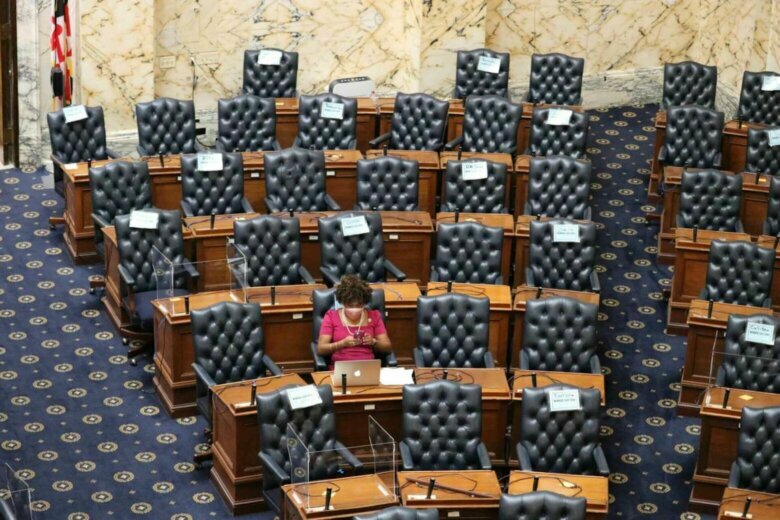This article was republished with permission from WTOP’s news partners at Maryland Matters. Sign up for Maryland Matters’ free email subscription today.

This content was republished with permission from WTOP’s news partners at Maryland Matters. Sign up for Maryland Matters’ free email subscription today.
As recently as 1998, Montgomery County sent eight Republicans to the House of Delegates (two were from Howard County but represented a slice of northeastern Montgomery).
Three of the county’s eight state senators were Republicans (one also based in Howard). Two of the nine Montgomery County Council members belonged to the GOP. And the county’s principal member of Congress at the time, Constance A. Morella, was also a Republican.
But election cycle after election cycle, the Republicans started losing political races in Maryland’s largest jurisdiction. GOP officeholders became extinct in Montgomery County in 2006.
“Apparently diversity does not include in Montgomery County diversity of thought,” Del. Mark N. Fisher (R-Calvert) thundered on the House floor on Friday evening.
Why, Fisher wondered, was Anne Arundel County, with 134,000 enrolled Republicans out of 406,000 registered voters, able to elect Republicans to state and local office? Why was Baltimore County, with 145,000 GOP voters out of 577,000 total, able to elect some Republicans? And why was the GOP, with 105,000 enrolled Republicans out of 688,000 total voters, completely shut out in Montgomery County?
Fisher’s questions came during the third day of contentious debate on the House floor over legislation from Del. Brian M. Crosby (D-St. Mary’s) that would change the way some Maryland counties elect their commissioners. The bill would require that, if a candidate for county commissioner is running to represent a specific district in Calvert, Charles, Garrett, Queen Anne’s or St. Mary’s counties, that commissioner’s election must be decided only by voters within that district.
Crosby and the bill’s backers have said the current system in those five counties, where district candidates are elected by countywide voters, disenfranchises people of color by diluting the votes from their neighborhoods. But after three long days of grueling and often repetitive debate, Fisher tried to turn that argument on its head.
“I think it’s important that we include equity for Republicans,” he said.
So, after watching several Republican amendments go down over the course of three days ― mainly designed to preserve the current system or take specific counties out of the bill ― Fisher offered an amendment that would require Montgomery County political mapmakers to guarantee that at least one County Council district would be drawn expressly to elect a Republican in 2022.
Fisher said that the “group think” in Montgomery County “has led to some of the worst policies and embarrassing policies in the United States” ― specifically the short-lived decision by the county government last fall to keep private schools closed due to COVID-19, just as public schools have been.
That was enough for Del. Marc Korman (D), the chairman of the Montgomery County House delegation, who leapt to his feet without being recognized by Speaker Adrienne A. Jones (D-Baltimore County).
“That’s the [county] health officer who made the ruling about the [private] schools!” Korman yelled.
“It was based on the teachers’ union lobbying the county executive and the county council,” Fisher retorted.
Fisher then went on to compare his home territory, where the population as of mid-2019 was estimated to be 78% white, with Montgomery County, where the population in mid-2019 was estimated to be 43% white.
“In Calvert County, we have not only diversity of officeholders, and diversity of race, but diversity of thought,” he said. “In Montgomery County, diversity only applies to how you look.”
Del. Jheanelle K. Wilkins (D-Montgomery), who as floor leader for the bill has wearily risen time and time again to remind her colleagues that Crosby’s legislation was introduced to achieve “fair representation for all,” was rendered temporarily speechless by Fisher’s proposed amendment.
“Wow,” she said. “It’s hard to find the words to say to respond to that.” But she did eventually suggest Fisher was “trying to impugn my county.”
Eventually, Fisher’s amendment went down on a 41-91 vote ― about the same party-line margin that befell all the other GOP amendments. It was the last amendment of the debate.
“It’s sort of like the Wild West,” said Del. Susan W. Krebs (R-Carroll). “Things are moving really quickly.”
A different amendment that would affect Montgomery County was passed by the House, on a voice vote. That amendment, from Wilkins, would require district-based school board positions to be elected only by voters in their districts.
The bill moves to a final House vote likely early next week. There is no equivalent legislation in the state Senate.
House Majority Leader Eric G. Luedtke (D-Montgomery) put the debate over Crosby’s bill in the context of broader and deeper conversations lawmakers have been having throughout this year’s General Assembly session.
“We’re going to have difficult conversations this session on the topic of race,” he said.
jkurtz@marylandmatters.org








